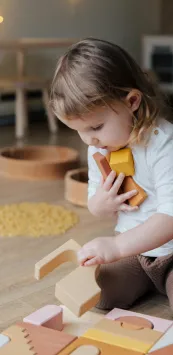Understanding Trauma & Rehabilitation
When a child experiences an injury, surgery, or medical event that impacts their movement, strength, or daily function, the road to recovery can be long and uncertain. Whether it’s a broken bone, a brain injury, or a complex surgery, rehabilitation plays a vital role in helping children regain function, confidence, and independence.
At South West Kids Clinic, our team of paediatric physiotherapists, occupational therapists, speech pathologists, and dietitians work together to support children recovering from trauma. Our rehabilitation approach is child-focused, goal-driven, and tailored to each family’s journey.
Signs your child may need rehab support
Every child responds differently to trauma or medical recovery. You might notice:
- Reduced strength or endurance compared to before the event
- Difficulty with walking, balance, or coordination
- Loss of previously learned skills (e.g. sitting, standing, eating)
- Muscle stiffness or contractures after prolonged immobility
- Pain or discomfort with movement
- Difficulty with daily activities like dressing, toileting, or eating
- Changes in communication, attention, or memory
- Feeding difficulties or weight loss after illness or treatment
- Emotional withdrawal or reduced engagement in activities
Rehabilitation focuses on restoring function – step by step – so your child can return to doing what they love.
Common Causes & Risk Factors of Paediatric Rehabilitation Needs
Rehabilitation may be required after:
- Traumatic events – such as falls, accidents, or sports injuries
- Orthopaedic surgery – including tendon transfers, joint realignment, or lengthening procedures
- Neurological events – such as acquired brain injury, seizures, or stroke
- Congenital conditions requiring surgery – such as hip dysplasia or scoliosis
- Medical illness or deconditioning – from long hospital stays or complex care needs
- Cancer treatment or chronic disease – where strength, energy, or motor function has been affected
Whatever the cause, our team is here to support your child’s recovery with care, structure, and encouragement.
Personalised Therapy Solutions We Can Implement
Physiotherapy for Trauma & Rehabilitation
Our physiotherapists work on restoring mobility, strength, balance, and endurance. We tailor your child’s rehab plan to their current abilities and goals – whether it’s getting back to sport, walking independently, or improving range of motion.
We provide:
- Functional rehabilitation plans following injury or surgery
- Pain management strategies and pacing techniques
- Orthotic and equipment assessment (e.g. splints, walkers)
- Strengthening, stretching, and balance programs
- Serial casting or positioning supports
- Hydrotherapy for low-impact rehabilitation
- Home programs and school return support
Occupational Therapy for Trauma & Rehabilitation
Occupational therapists focus on helping children re-learn daily tasks such as dressing, eating, writing, and self-care. We also support upper limb rehabilitation and cognitive function where needed.
Our OTs offer:
- Task-specific rehabilitation (e.g. fine motor skills, hand function)
- Splinting, upper limb therapy, and scar management
- Re-training of routines and self-care skills
- Environmental modifications (home and school)
- Visual motor and perceptual retraining
Speech Pathology for Trauma & Rehabilitation
Speech pathologists provide therapy for children who’ve had changes in communication, swallowing, or language function due to neurological trauma or medical treatment.
We support:
- Rebuilding expressive and receptive language skills
- Speech clarity, voice, or fluency issues
- Swallowing safety and feeding support post-illness or surgery
- AAC (Augmentative and Alternative Communication) where needed
- Social communication and attention retraining
- School communication goals after prolonged absence
Dietetics for Trauma & Rehabilitation
After injury, illness, or hospitalisation, children may have altered appetite, feeding patterns, or nutritional needs. Our dietitians support recovery through tailored plans that promote healing, energy, and healthy growth.
We provide:
- Nutritional assessments post-hospitalisation
- Feeding support and safe texture modifications
- Tube feeding monitoring and weaning support
- Strategies to support weight gain and energy intake
- Reflux or constipation management
- Return-to-eating plans for children who’ve had feeding interruptions
Why choose South West Kids Clinic to help your child with Spina Bifida?
- Dedicated team with experience across orthopaedic, neurological, and post-surgical rehab
- Child-focused care that’s engaging, motivating, and goal-based
- Access to advanced rehab equipment (Spider Cage, Pediasuit, hydrotherapy, and more)
- Strong communication with medical and surgical teams
- Emotional support for families navigating recovery
- Flexible programs - from short-term rehab blocks to long-term care
We are passionate about helping children rebuild their strength, regain their skills, and return to the things that bring them joy.
Support for families with a child with Spina Bifida
In addition to our services, families may also find support through:
- Brain Injury Australia
- Kids Health at The Children’s Hospital at Westmead
- Royal Children’s Hospital – Trauma & Rehab Resources
Frequently asked questions
How soon after injury or surgery should we start therapy?
As early as possible – once your medical or surgical team clears your child for therapy. Early intervention helps prevent secondary issues and speeds up recovery.
What types of therapy will my child need?
It depends on your child’s injury and goals. Most children benefit from physiotherapy and occupational therapy. Some also need speech pathology or dietetics. We create a team plan just for your child.
Will therapy be painful or overwhelming for my child?
Our therapy is gentle, paced to your child’s tolerance, and play-based where possible. We focus on confidence and motivation while supporting physical recovery.
Can you help my child return to school or sport?
Yes. We provide school reintegration support, sports-specific rehab, and liaise with schools or coaches where helpful.
What if my child’s recovery is slower than expected?
- Recovery isn’t linear. We celebrate every gain – big or small – and adjust therapy plans as your child progresses. We’re in this with you for the long haul.




